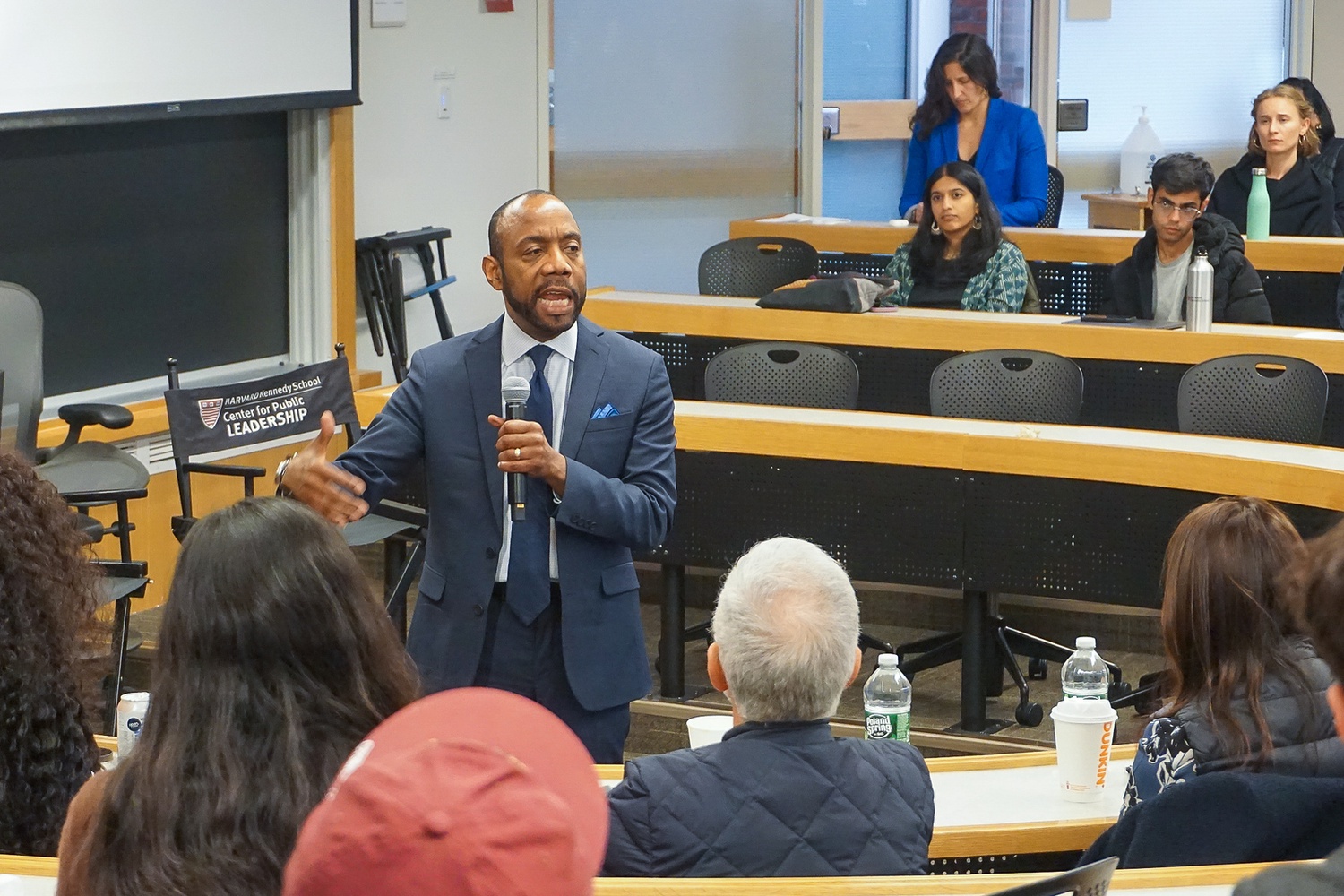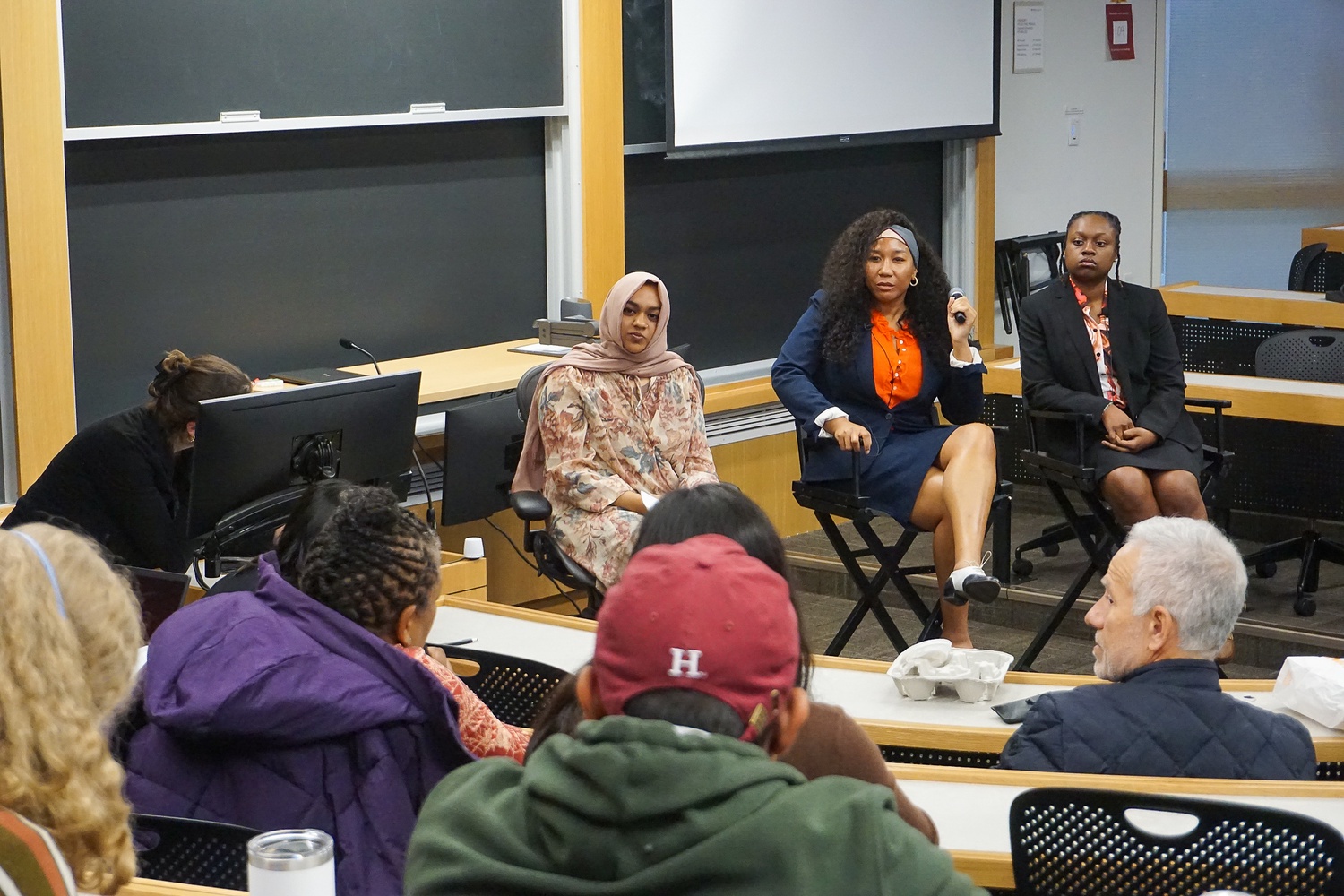
News
Pro-Palestine Encampment Represents First Major Test for Harvard President Alan Garber

News
Israeli PM Benjamin Netanyahu Condemns Antisemitism at U.S. Colleges Amid Encampment at Harvard

News
‘A Joke’: Nikole Hannah-Jones Says Harvard Should Spend More on Legacy of Slavery Initiative

News
Massachusetts ACLU Demands Harvard Reinstate PSC in Letter

News
LIVE UPDATES: Pro-Palestine Protesters Begin Encampment in Harvard Yard
Former NAACP President Condemns Black Man’s 2018 Death as Modern-Day Lynching at Kennedy School Talk

Roughly 70 Harvard affiliates gathered at Harvard Kennedy School Wednesday for a panel on modern-day lynching and racialized violence, centering around the 2018 death of William A. “Willie” Jones Jr.
HKS professor and former NAACP President Cornell William Brooks stressed during the talk that lynching remains a serious issue in the United States today. Brooks and HKS student Ayesha Islam moderated the panel, which featured guest speakers Jill C. Jefferson, the founder and president of civil rights organization JULIAN, and Ayana Jones, a JULIAN organizer.
A team of students in Brooks’ class — MLD-375: “Creating Justice in Real Time: Vision, Strategies, and Campaigns” — hosted the panel with support from the school’s William Monroe Trotter Collaborative for Social Justice.
Lynchings in the last century “numbered about 4,000 or so,” Brooks told attendees at the start of the event.
“These are the kinds of things that one might assume are relegated to the dustbin of history, buried in the bowels of the National Archives,” he said. “But the fact of the matter is that lynchings occurred, certainly all across this country — and I will make the case — continue to this very day.”
Jones, a 21-year-old Black man, was found dead outside the house of his white girlfriend’s family in Scott County, Mississippi, on Feb. 8, 2018.
While local police and the district attorney’s office ruled Jones’ death a suicide, Jefferson, an attorney for Jones’ family, said the death was a “clear case of lynching.” She pointed to suspicious circumstances surrounding Jones’ death, such as an arm injury he received while playing football that would have made it difficult for him to take his own life.
“Why was there grass in his hair if his head never touched the ground? How could he have committed suicide with his arm injury? What about the people who heard him screaming for his life before the cops came?” Jefferson said. “We have so much evidence, so much evidence, and the DA refuses to do anything about it.”
According to the Associated Press, Scott County District Attorney Steven Kilgore said in 2021 that he would not present the case to a grand jury with the same evidence, though he added that if new evidence were brought forward, he would be open to pursuing criminal charges.
“If we had a reason to reopen it, we would do it without hesitation,” Kilgore said. “As of now, we don’t have a reason to do that.”
In an interview with The Crimson, Brooks said the district attorney’s investigation into Jones’ case was “absolutely abysmal and incompetent” and called for “state and federal charges brought against the perpetrators of the crime.”
Kilgore, the district attorney, did not immediately respond to a phone call seeking comment.
Jefferson said she first researched Jones’ case as a student at Harvard Law School in 2018. After becoming an attorney in Washington, she reached out to Jones’ family to take on the case pro bono. Jefferson said Jones’ death devastated the people of Scott County.
“This lynching tore that community apart,” she said. “People stopped coming out of their houses. They stopped talking to each other. The trust was broken.”

An independent investigation by the Bellinder Law Firm, Jefferson, and the People’s Advocacy Institute found evidence that contradicted the initial suicide ruling. In a civil suit, Judge Winston Kidd awarded Jones’ family more than $11 million.
Jefferson added that Jones’ mother, Tammie Townsend, has an “incredible spirit, but she has been broken in a million ways.” According to Jefferson, Townsend moved to Houston after her son died, where she “lost the last of what she had of her son” when a storage facility wrongfully sold her belongings.
“And you have to think about the fact that she knows these lynchers are free. These people are walking around free — they’re living their lives when her son can’t,” Jefferson said. “It shows the difference in what lives matter and what lives don’t.”
Ayana Jones, who is from Mississippi, said she would like to see not only justice for Jones’ family but also a healing of Scott County.
“Justice for me means community power,” she said, adding that she wishes for residents to regain trust within one another and for kids to be able to “play and not feel scared to be outside”
During the panel, Jefferson discussed the challenges she has faced as a Black female attorney in the South, adding that she believes sexism may have played a role in the lack of progress on the case.
“Women in this field are not just overlooked but held down,” Jefferson said, pointing to the oppression faced by civil rights activists Dorothy Height and Rosa Parks. “Pretty much all of the experts in civil rights are women, but nobody knows that.”
“If I had been, say, Ben Crump, if that had been my name — take away everything else I have accomplished, just put that name on me, and give me a different gender — then this case probably would have already had justice,” Jefferson added. “This case would have already been in national news a million times over.”
Brooks told the audience that Jones’ death fits into a larger pattern of violence against Black Americans.
“The lynching of Willie Jones is not morally exceptional, not historically aberrational, but in fact — in the context of American history — almost tragically regular and routine,” Brooks said.
—Staff writer Ryan H. Doan-Nguyen can be reached at ryan.doannguyen@thecrimson.com. Follow him on Twitter @ryandoannguyen.
Want to keep up with breaking news? Subscribe to our email newsletter.
